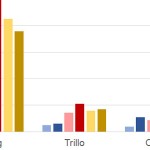If a Man Says “Darlin'” in the Woods, Does It Make a Harassment?
The defining characteristic of our age may be the degree to which we really do live in different worlds, side by side. Following my post about some Pew Research findings from a sexual harassment survey, I’ve found that reality to be palpable. One can hardly discuss the matter with people who seem to inhabit a world that follows different rules for reason and standards of evidence.
I’ve been astonished, for instance, to find intelligent people who really do believe that men are the sex that inspires fear and therefore should have no say in discussions about society’s definitions of and attitude toward sexual harassment. (Suggest that this putative ability to be fearful might reasonably make men a better fit for some jobs, however, and I suspect you’d be roundly criticized.)
A different line of thought is even more fascinating. Faced with a survey finding that women with college degrees claim more sexual harassment, some people conclude that women with less education must claim less harassment because they actually experience more. Of course, they don’t put it quite so succinctly. Rather, they start with the claims that blue collar workplaces are more permissive of boorish behavior and that blue collar women have less power. They therefore become inured to the constant sexism and, though no longer conscious of it, are beaten down by it.
Ostensibly, we know this to be true because women in blue collar occupations will tell us about it… except, apparently, when asked for anonymous surveys
Let’s grant the claim that women without college experience do indeed tend to work in environments that are less (let’s say) socially conscious. This only brings us back to mthe initial question: How much is the blue collar environment actually festering with harassment, and how much is the white collar environment overly sensitive about benign behavior?
Imagine a diner serving a blue collar clientel. An older man regularly has lunch there and calls the waitress “darlin’.” In his habit and usage, “darlin'” is something like a familiar and more-equal version of “ma’am.” That’s how he uses it, and that is how the waitress takes it, and it doesn’t occur to her that she’s being harassed.
Is she? The man does not believe that his use of the word gives him any advantage over her, and she doesn’t see it as belittling her. Moreover, nobody around them believes that’s the effect.
Now imagine that the man, getting on in years as he is, makes a career move to a white collar office. Here, “darlin'” rings differently in a coworker’s ears. She complains, and the man is reprimanded. Did he harass her? Where was the balance of power in this interaction?
One reason these questions take academia by storm is that they are so subtle and endlessly variable. How is it that people come out of its influence so confident that a single sharp rule must apply in every context? It seems to me that the most real power and the most mature attitude would be found in those who can interpret people’s language in the terms that they intend and not feel diminished by a diversity of attitudes.




